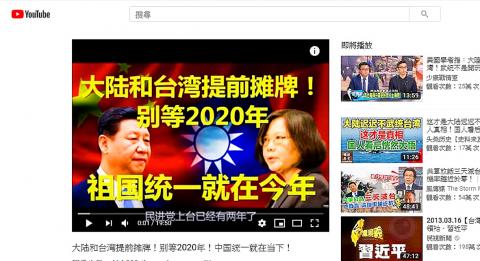China has been creating fake social media accounts to interfere with the Nov. 24 elections as practice for manipulating the 2020 elections to elect candidates favorable toward Beijing, a National Security Bureau source said on Saturday.
China’s fake news is largely centered on issues related to Taiwan’s defense, cross-strait relations and the policies of President Tsai Ing-wen’s (蔡英文) administration, and generally gets published first by Chinese outlets such as the Global Times, Straits Today (今日海峽) and Taihai Net (台海網), the source said.
The content is then edited by the Chinese People’s Liberation Army’s (PLA) cyberwarfare division or the 50 Cent Army — Internet users paid to support Beijing’s propaganda online — and reposted to PTT — Taiwan’s largest online bulletin board system — the Line messaging app, YouTube and other social media platforms, the source said.

Photo: Screen grab from the Internet
There are a growing number of Chinese accounts aimed at Taiwan on YouTube, such as Jianghu Baixiaosheng (江湖百曉生) and Touhao Zhanjiang (頭號戰將), which both have nearly 30,000 Taiwanese followers, the source said.
These accounts have each published nearly 1,000 videos in the six months they have been active, and the content is largely commentary critical of Tsai and US President Donald Trump sourced from the Global Times, the source added.
Some of the videos on Jianghu Baixiaosheng, including one advocating a PLA takeover of Taiwan, have been shared on Facebook by Taiwanese users, the source said.
China’s information warfare efforts are an evolution of a PLA unit that was established at the end of 2015 to conduct intelligence gathering, attacks on servers and networks, cognitive hacking and psychological warfare, the source said, adding that the branch today has an estimated 300,000 personnel.
Taiwan has long been a testing ground for Chinese cyberattacks, and last year the bureau intercepted an average of 100,000 online attacks from China per month, the source said.
China’s cyberwarfare specialists are familiar with social issues in Taiwan and inject divisive commentary into discussions on controversial topics in an attempt to create social strife, the source said, citing the fake story about Chinese consulate officials helping Chinese passengers stranded at Osaka’s Kansai International Airport following Typhoon Jebi.
Bureau Director-General Peng Sheng-chu (彭勝竹) on Thursday told a meeting of the Legislative Yuan’s Foreign Affairs and National Defense Committee that Beijing and the PLA were behind a propaganda campaign to interfere with the nation’s democratic elections by creating disinformation and fake news targeting Taiwanese media outlets, radio and television programs and Web sites, Peng said.
Premier William Lai (賴清德) on Friday told an inter-ministerial meeting at the Executive Yuan that this month’s elections were being undermined because of China’s spread of disinformation, financial support of certain candidates and sponsoring of television and radio programs, as well as cyberattacks.

A Ministry of Foreign Affairs official yesterday said that a delegation that visited China for an APEC meeting did not receive any kind of treatment that downgraded Taiwan’s sovereignty. Department of International Organizations Director-General Jonathan Sun (孫儉元) said that he and a group of ministry officials visited Shenzhen, China, to attend the APEC Informal Senior Officials’ Meeting last month. The trip went “smoothly and safely” for all Taiwanese delegates, as the Chinese side arranged the trip in accordance with long-standing practices, Sun said at the ministry’s weekly briefing. The Taiwanese group did not encounter any political suppression, he said. Sun made the remarks when

PREPAREDNESS: Given the difficulty of importing ammunition during wartime, the Ministry of National Defense said it would prioritize ‘coproduction’ partnerships A newly formed unit of the Marine Corps tasked with land-based security operations has recently replaced its aging, domestically produced rifles with more advanced, US-made M4A1 rifles, a source said yesterday. The unnamed source familiar with the matter said the First Security Battalion of the Marine Corps’ Air Defense and Base Guard Group has replaced its older T65K2 rifles, which have been in service since the late 1980s, with the newly received M4A1s. The source did not say exactly when the upgrade took place or how many M4A1s were issued to the battalion. The confirmation came after Chinese-language media reported

The Taiwanese passport ranked 33rd in a global listing of passports by convenience this month, rising three places from last month’s ranking, but matching its position in January last year. The Henley Passport Index, an international ranking of passports by the number of designations its holder can travel to without a visa, showed that the Taiwan passport enables holders to travel to 139 countries and territories without a visa. Singapore’s passport was ranked the most powerful with visa-free access to 192 destinations out of 227, according to the index published on Tuesday by UK-based migration investment consultancy firm Henley and Partners. Japan’s and

BROAD AGREEMENT: The two are nearing a trade deal to reduce Taiwan’s tariff to 15% and a commitment for TSMC to build five more fabs, a ‘New York Times’ report said Taiwan and the US have reached a broad consensus on a trade deal, the Executive Yuan’s Office of Trade Negotiations said yesterday, after a report said that Washington is set to reduce Taiwan’s tariff rate to 15 percent. The New York Times on Monday reported that the two nations are nearing a trade deal to reduce Taiwan’s tariff rate to 15 percent and commit Taiwan Semiconductor Manufacturing Co (TSMC, 台積電) to building at least five more facilities in the US. “The agreement, which has been under negotiation for months, is being legally scrubbed and could be announced this month,” the paper said,